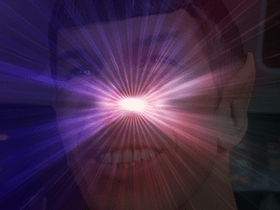
With the passing of Leonard Nimoy, there will be tributes and expression of great love for the Jewish actor who brought Mr. Spock to life on TV and the big screen. People will wear pointy ears, hold up the “live long and prosper” sign, and quote him. Sci-fi conventions will be held in his honor. Pundits, fans, and enthusiasts alike will wax eloquent about the contribution Mr. Nimoy made to the Star Trek series, its ethos, and even a certain view of the universe.
I watched an early interview with Gene Roddenberry, the creator of the Star Trek series, in which he described the Spock character as looking like “the devil himself.” I imagine this was due to the extremely raised eyebrows, the pointy ears, and some might say, the Jewish look of the actor. The statement made my eyes roll. Of course the devil looks Jewish, right? Isn’t that the stereotype? The devil looks Jewish, he has a goatee, pointy ears, etc. You fill in the blanks.
But Roddenberry’s quaint and silly imagination as to what the devil looks like was greatly overshadowed by his expansive view of the universe and humanity, a view which Nimoy himself would say greatly influenced his own perspective on life and reality. Over the years this view has become, I would argue, the leading secular worldview in competition against biblical Judeo-Christian monotheism.
There are two components to what I will call the Star Trek Worldview. Some might say these are both part of post-modernism, but I think they are more popularly understood in terms of the space age, and science fiction. They are as follows: 1) We are living today in the midst of a great moment of human evolution, and so 2) we now embrace all manner of diversity in humankind, including moral diversity.
Over the years, the Star Trek series has shown characters arguing that mankind has evolved past war, strife, hunger, and poverty. This is not the same sort of evolution one might propose in which God may have used a brand of theistic evolution as a means of bringing life to where it is today. Rather, it is a perspective that says we, right now, at this moment, are evolving before our very own eyes. We can see it on our computers. We can see it in humanity. Things are not as they once were, and there is no looking back. If you want to become a green-headed space alien we have the means of making you look like one, and who is to stop you? That is your right.
On the same token, we are embracing all manner of morality, and judging none. Holy matrimony has given way to a redefining of marriage to whatever permutation one desires. At the same time gender has become completely subjective, as illustrated by Facebook’s multitude of gender options. And again, if a person wants to become a purple-skinned, multi-sexual, polygamist, who is to complain? This is the new frontier here. We are embracing all forms of diversity, and evolving into a better humanity. That’s Star Trek for you.
The Star Trek Worldview also, quite obviously, has an outer space component to it. This is fascinating, as Spock might say, because many of the cults have the same. Scientology, Mormonism, and the Raelian Movement, all incorporate space age adventurism into their beliefs. This stands in stark contrast to the Biblical worldview which is intrinsically earth bound.
We are told in Genesis that God created the heavens and the earth, and in Revelation that God will re-created the heavens and the earth. We are also told by Jesus in several passages that there are two distinct realms: one heavenly, one on earth.
The Puritans understood this clearly, and walked as pilgrims through the fallen world, always keeping an eye and a vision of heaven before them.
Early theology drew a sharp distinction between the church militant, and the church triumphant, with the former being those of us trudging through the fallen sinful world, and the later being those who have passed on, joining with the heavenly realm of the Kingdom of God.
In Star Trek there is only one grand universe, and it can be probed through science; in biblical theology there is an unseen reality waiting on the other side of life. And unlike sci-fi, the Bible teaches us that a loving Creator is responsible for the universe.
So the Star Trek Worldview is ironically very earthly, materialistic, and bleak. It holds only to what can be verified by the sciences and contacted through the senses. It leaves no room for faith in something which cannot be seen, heard, touched, tasted, or smelled. Yet that is exactly what Jesus alludes to when he says, “Do not store up for yourselves treasures on earth, but store up treasures in heaven…For where your treasure is there your heart will be also.” (Matt 6:19-21) Jesus calls us to trust in that which cannot be reached through evolution or space exploration.
At the end of all things humanity will not simply evolve into moral perfection. This we can see clearly from the trajectory of human history. According to the Star Trek Worldview, the best possible outcome we can hope for is that we might one day go star hopping through the galaxy. But in the end God “has appointed man to die once.” (Hebrews 9:27) Leonard Nimoy has now had the chance to experience this personally. So will you and I, one day when our time comes.
I can only hope he made his peace with God, as a child of Abraham, rather than a Vulcan. And I can only pray to see him one day in heaven, at the great wedding feast of the Lamb. The fortunate thing about the biblical worldview is that on the other side of life there exists a merciful God.